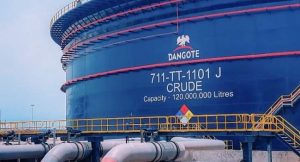
Hearing in a suit filed by Dangote Petroleum Refinery and Petrochemicals FZE over a bid to stop issuance of oil import licenses to some oil marketing companies suffēred a setback on Monday at a Federal High Court in Abuja.
The matter, which was scheduled for hearing before Justice Inyang Ekwo, could not proceed due to the delay by Dangote Refinery to serve its amended originating summons on the defendants.
The News Agency of Nigeria (NAN) reports that Dangote Refinery had sued NMDPRA and Nigeria National Petroleum Corporation Limited (NNPCL) as 1st and 2nd defendants.
Also joined as 3rd to 7th defendants, respectively, in the originating summons, marked FHC/ABJ/CS/1324/2024 and dated Sept. 6, are AYM Shafa Limited, A. A. Rano Limited, T. Time Petroleum Limited, 2015 Petroleum Limited, and Matrix Petroleum Services Limited.
The oil company, through its lawyer, Ogwu Onoja, SAN, prayed the court to nullify import licenses issued by NMDPRA to the NNPCL and the five other companies to import refined petroleum products.
The company (plaintiff) also prayed to the court to declare that NMDPRA viõlated Sections 317(8) and (9) of the Petroleum Industry Act (PIA) by issuing licenses for the importation of petroleum products.
It stated that such licenses should only be issued in circumstances where there is a petroleum product shortfall.
It equally sought N100 billion in damages against NMDPRA for allegedly continuing to issue import licenses to NNPCL and the five companies for importing petroleum products, among other reliefs.
When the matter was called, George Ibrahim, who appeared for the plaintiff (Dangote), informed the court that the matter was fixed for report of settlement or report of service.
Ibrahim, however, said they had been unable to take steps to effect service of the processes and that issues of reconciliation had also not been looked into because of a motion filed to amend their originating summons due to the error discovered in the earlier application.
He said the application was dated Nov. 25, 2024, and filed Nov. 28, 2024.
Counsel to NMDPRA, Mathew Bukar, SAN; lawyer to the 3rd, 4th, and 7th defendants (AYM Shafa, A.A. Rano Limited, and Matrix Limited), Ahmed Raji, SAN, and that of the 5th and 6th defendants (T. Time Petroleum and 2015 Petroleum Limited), Divine Oguru, told the court that they were yet to be served with the plaintiff’s application.
But Ademola Abimbola, who appeared for NNPCL (2nd defendant), said he was only served with the application at about 9 am before the court began sitting.
Abimbola said Dangote Refinery served them with the amended originating summons because they objected that the 2nd defendant should not have been a party in the suit since its registered name was not what it was sued with.
The lawyer, who said the plaintiff amended the suit because it was already in the media, said the application would be studied for an appropriate response.
He said based on this and in compliance with Section 317 [9] of the PIA (Petroleum Industry Act), NMDPRA issued licenses to import petroleum products to bridge product shortfalls to companies with good track records of international products trading.
Besides, he said the agency is also mandated to promote competition and prevent abuse of dominant market positions and unhealthy monopolies in the oil and gas sector.
He denied the allegation that NMDPRA is partaking in any purported “grand conspiracy and concerted efforts” against the refinery, describing it as “an allegation for which the plaintiff has provided no facts or evidence in support.”
NAN earlier reported that the NNPCL, in its preliminary objection dated and filed Nov. 15, 2024, also prayed the court to strike out the case for being incompetent.
Also, the oil marketers, in a joint counter affidavit filed on Nov. 5, 2024, told the court that granting Dangote’s application would spell doom for the country’s oil sector.
According to them, the plan to monopolise the oil sector is a recipe for disaster in the country.
The three marketers, AYM Shafa Limited, A. A. Rano Limited, and Matrix Petroleum Services Limited, in their response, said the plaintiff did not produce adequate petroleum products for the daily consumption of Nigerians.
Besides, they argued that there was nothing placed before the court to prove the contrary.
Peoplesmind
